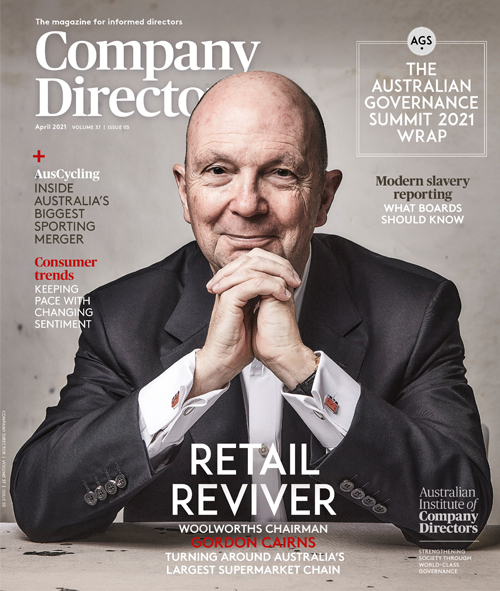The pandemic has tested us: our individual resilience, the strength of our economy and the ability of our organisations to adapt.
The pandemic has tested us: our individual resilience, the strength of our economy and the ability of our organisations to adapt. We are fortunate that our economy is rebounding so quickly — we are indeed the lucky country. We need to act so that the community feels that luck broadly. We need to keep bringing people with us. We need to reassure them of our future.
We have to remember that going into this crisis, we were not performing at our potential. Our poor productivity growth was lifted by immigration. We had weak real wage growth. Sustaining the spirit of innovation we’ve shown in the past year and accelerating our investment in science and technology are critical to assuring our prosperity.
My career has been predominantly in financial services. When I first became responsible for a treasury function, I remember vividly the aphorism the head of treasury used to frame my thinking: “Not taking a position is taking a position”. It made perfect sense in treasury terms. Not taking a risk is taking a risk.
As respected director David Gonski AC FAICDLife has recently observed, “The risk appetite of Australian companies is less now than what it was… over 30 years ago.”
What are the consequences?
International comparisons show that we continue to fall below where we should be on an international scale. We’re ranked 19th in the 2021 Bloomberg Innovation Index, behind countries like France, Belgium, Ireland and the United Kingdom.
Numerous innovation reviews have proposed paths to lift our standings, but still roadblocks remain to innovation in our economy:
- Our R&D tax incentive settings are not fit for purpose in our diverse economy.
- Collaboration across institutions is poor. Universities publish world-class research, but our pathways to commercialisation are opaque and fragmented.
- There are state-based innovation initiatives, but no cohesion across our national economy.
- The structure of our economy encourages incremental innovation even in the face of success such as Atlassian, Canva and Afterpay.
Speed is of the essence
Meanwhile, “Roaring Kitty” has demonstrated in the past few weeks that the forces shaping capital and technology are evolving ever faster. Business models need to adapt at speed or be disrupted. Even AI can fall behind the curve — a rocket emoji on a Reddit forum is not what natural-language AI models were built for. And we are all acutely aware of how the pandemic has changed the pace and technology of vaccine development.
We must take up the challenge of lifting our innovation performance. Given a challenge by the NSW government, mining infrastructure company Ampcontrol delivered a ventilator within 18 days, a process that would normally take up to nine months. It required cooperation between universities, government and industry. This may not be the new normal for the speed of change, but it suggests how much more we can achieve when we lift collaboration, plus the need for regulatory reform.
As individuals, working from home did become the new normal for many organisations. We couriered technology kit to our staff at home and adopted new collaboration platforms and tools. Innovation was literally delivered overnight for many organisations. At the same time, we had to wrestle with the implications for cybersecurity and corporate culture in a completely distributed workforce.
The momentum is there though. We took risks. How do we use that momentum to accelerate our national capabilities?
Before we accelerate, let’s reflect on whether the safety measures and settings we need are in place. The Crown inquiry showcases governance shortcomings that create community distrust. The final report of the aged care Royal Commission makes for sombre reading, emphasising yet again how we have failed one of the most vulnerable groups in our society. The lessons from serial Royal Commissions and inquiries continue to resonate.
Business model innovation and disruption raises its own challenges, as demonstrated by the recent UK judgement regarding Uber and Australia’s confrontation with Facebook.
Our momentum will slow against these forces. So how do we shift the balance back?
Sustaining public debate on the importance of innovation to our shared national prosperity is critical. The AICD will advocate for a regulatory environment that encourages innovation — a public conversation about director liability, as an example, may not be compelling for the average Australian, but our future depends on the right settings without providing any excuses for negligence, carelessness or complacency. The government’s recent announcement on disclosure laws is a positive step in the right direction.
In our favour, the 2021 Edelman Index found trust across all Australian institutions to be at an all-time high. Australia’s overall trust index recorded the largest gains globally in a survey of 27 countries. Business is regarded as the most competent institution, up 11 points and enjoying a 30-point lead over government.
Maintaining momentum
The momentum is there but trust is fragile. How do we fulfil expectations of our institutions as social actors?
To sustain our record levels of trust, there is an expectation that we will continue to contribute to public policy debate. We cannot underestimate the challenge. Seeking to understand what is genuinely in the national interest is demanding: the policy process is intensive and contested with diverse perspectives. The single-mindedness that served us well as executives and non-executives must not inhibit our capacity to genuinely listen to the different views of stakeholders.
Even when policy direction is established, governments are struggling to deliver outcomes in a polarised environment. We had a period of bipartisan co-operation during COVID-19, but that is now so 2020. Past habits are re-emerging and while dissent is core to democracy, the invasion of Capitol Hill is a warning that the manipulation of society through social media for pure political gain poses a threat. And traditional media is emulating the tactics of social media, likening opinions and views with facts and news.
In an understated section of his memoir A Promised Land, President Obama observes Donald Trump sitting at the table of The Washington Post White House Correspondents’ Association dinner. The Post would later turn on Trump, but only after it had helped to establish his credibility by reporting his views as news.
We should not be complacent — there are Australian parallels.
In this environment, the community expects us to show leadership. They expect us to act ethically, act with empathy, and play our part in solving societal problems.
We must seize this moment to set an agenda that drives Australian prosperity through increased productivity and innovation.
You will play a large part in setting that agenda, and answering these questions:
- How do we use our current momentum to accelerate our national capabilities?
- How do we shift the balance in our regulatory settings?
- How do we address expectations of our institutions as social actors?
- How do we sustain the spirit of innovation at our organisations?
The AICD will be your partner in this challenge. We will strive to be your independent and trusted source of governance education and information.
Together, we need to take a position.
A fragmented approach to a national innovation system will fail. Measured against the competing systems of the 18 countries ranked ahead of us or against the challenge of climate change, it falls short. This is an important public conversation.
To drive national prosperity, we must focus on the areas where we excel; align our research capability, education system and industry; collaborate across states, sectors and institutions; and encourage the people who take risks — commercial, academic, economic and political.
If we do not take a position, we take a position, and the risk to our prosperity is too great.
This is an edited version of Angus Armour’s address at the Australian Governance Summit on 1 March.
Latest news
Already a member?
Login to view this content



